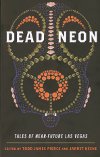

Dead Neon

Todd James Pierce and Jarret Keene (eds.)
Reviewed by Michael Odell
- Avoid
- Browse
- Buy
- Love
- Never Play Without It
With pleasure at every turn, Las Vegas is a city of excess. Not only are there few, if any, places like it on earth, but the avarice, hedonism, and disheartenment it breeds makes for the perfect literary backdrop. In Dead Neon, readers will find fourteen short stories set in near future versions of Sin City. Discover intriguing tales about an American theocracy taking hold, a casino that has an actual portal to hell, and what life in the desert after the apocalypse might look like. Whether you love science fiction or want to get familiar with Nevada's burgeoning artistic scene, Dead Neon has plenty of life in its pages.
With its gas mask themed cover and provocative subject matter, the University of Nevada Press’ Dead Neon is both a thrilling and confrontational read. Featuring fourteen short stories by a range of authors, including cyberpunk luminary K.W Jeter, Dead Neon taps into the ‘futurism’ and ‘hints of the apocalypse’ that remain at the core of Sin City. Desolate and often disturbing, the stories successfully combine science fiction-esque writing with the mystique that surrounds Las Vegas.
Indeed, throughout the short story collection there are references to typical science fiction tropes. For example, ‘Words of God’, an official language condoned by the ‘Onegod government’ in Chris Niles’ opening story, ‘Sin’s Last Stand’, bears a passing similarity to George Orwell’s Newspeak, the language in 1984. However, to suggest such affinities are merely included as ‘knowing nods’ to the genre would be to deny the messages each author is keen to portray. Niles’ story deals with the relationship between atheism and Christianity, as well as the no-man’s land that Las Vegas has effectively become for both parties as ‘America’s playground’. Examining the stories, it’s clear that the theme present throughout Dead Neon is the question of ‘what if?’ Each author examines part of Las Vegas and pushes it to its limits, creating a fascinating dystopian view of the future.
Elsewhere in Dead Neon, Bliss Esposito’s energetic tale, ‘Kirby and the Portal to Hell’, quite literally pokes fun at Las Vegas’ Sin City nickname, by having a portal to hell open behind a casino vending machine. While stories such as Esposito’s could be considered lighter in subject tone than others, such as K.W Jeter’s dark closing tale, ‘Bones’, each has its own value and message. Indeed, Esposito's tale draws attention to the sheer desperation of casinos in their efforts to combat the effects of the recession. In ‘Kirby and the Portal to Hell’, the casino CEO Gene Banks gives no thought to the implications of sending a man into hell, instead focusing on how the portal will improve his business.
The stories presented in Dead Neon do not tap into the past glories of the Atomic Age. Instead, the tone is altogether darker: more The Road than The Jetsons. However, given the current challenges Las Vegas faces both economically and environmentally, it would be only a part-exaggeration to suggest that Dead Neon acts as a zeitgeist for current feelings in Sin City. Along with Matthew O’Brien’s recent title, My Week at the Blue Angel, this new wave of books emerging from the Silver State portrays the true undercurrent of Nevada. Here’s hoping we hear more from Las Vegas’ new literary voices over the coming months.
